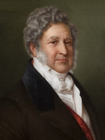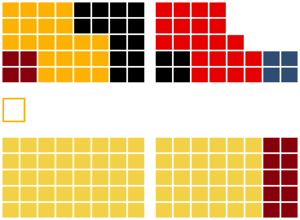Lagerhuis elections, 1709
| ||||||||||||||||||||||||||||||||||||||||||||||||||||||||||||||||||||||||
| ||||||||||||||||||||||||||||||||||||||||||||||||||||||||||||||||||||||||
| Turnout: 82,15% | ||||||||||||||||||||||||||||||||||||||||||||||||||||||||||||||||||||||||
| ||||||||||||||||||||||||||||||||||||||||||||||||||||||||||||||||||||||||
The Lagerhuis elecions of 1709 AN proved to be a landslide in the political landscape. The incumbent prime minister, Gisela Starck, came under heavy fire over recent treaties. Voters were not satisfied with Gisela's explanation and opted for the political bastion: Joseph des Vinandy-Windsor. At the Radicals, the helm had been taken over by Anne-Marie Montrarde. She is the granddaughter of Jacques Montrarde.
Controversial treaties
In a short time, the government led by Gisela Starck ceded territory of the kingdom to other nations. In the first treaty, the Brettish Isles were ceded to Calbion. In return, the northern Beneluccas were added to the kingdom. The criticism was that the exchange was unequal, the Brettish Isles being more part of Batavia, than the Beneluccas.
Harder was the criticism of the second treaty. In that treaty, the northern Beneluccas that had just been obtained were ceded back to Çakaristan. In exchange, the lease by Çakaristan for a military base at Zeeburg was given up.
The last treaty had already been decided in the back rooms and was voted on in the Lagerhuis on the last day before a recess. The vote itself was unexpected, causing several members to leave the Huys van het Bataafsche Volck. This treaty not only settled the transfer of the northern Beneluccas and the lease for the military base. It also provided for the handing over of the former Frankish weaponry to Çakaristan.
Nail in the coffin
Traditionally, election debates were held. But this time, Gisela was challenged to a one-on-one debate with Joseph des Vinandy-Windsor. This debate was broadcast live on television and took place on the evening before election day. Gisela could not quite explain what the kingdom had gained from the controversial treaties. Joseph, a political animal at heart, took advantage of this by going on the attack.
Joseph accused Gisela of political corruption. The strange vote of an already decided treaty, he suggested that Gisela might have been paid by Çakaristan to hand over the Frankish weaponry. Gisela was upset and could not refute the allegations sufficiently.
Gisela began to list her political successes. But Joseph emphasised the missed opportunities for good relations with neighbouring countries. After all, the Benacian Union had built fortifications along the border with Batavia in response to the choice of a military alliance with Çakaristan. Joseph said, "What is that military alliance worth if Çakaristan gets the Frankish advanced weapons as a gift and receives the jointly developed fighter jet?" Gisela had a long response, but no real answer.






